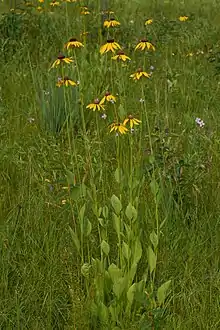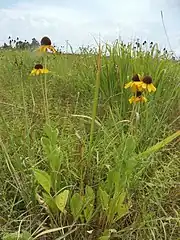Rudbeckia grandiflora
Rudbeckia grandiflora, commonly called rough coneflower,[1] is a species of flowering plant in the family Asteraceae.
| Rudbeckia grandiflora | |
|---|---|
 | |
| Scientific classification | |
| Kingdom: | Plantae |
| Clade: | Tracheophytes |
| Clade: | Angiosperms |
| Clade: | Eudicots |
| Clade: | Asterids |
| Order: | Asterales |
| Family: | Asteraceae |
| Genus: | Rudbeckia |
| Species: | R. grandiflora |
| Binomial name | |
| Rudbeckia grandiflora | |
Description

Growing wild in Arkansas
It is a perennial from a woody base, growing to around 120 cm tall. It produces relatively large inflorescences, with 12-25 yellow ray flowers, each around 3–5 cm long. It blooms from late spring into summer.[2][3]
Distribution
It is native to North America, where it is found primarily in the south-central United States, including a disjunct population in northwest Georgia.[4][5] The other populations farther east, all small and isolated, are believed to have originated from human introductions.
Its typical natural habitat is in prairies and open woodlands.[2][3]
Taxonomy
Two varieties are recognized:[4][2]
- Rudbeckia grandiflora var. alismifolia - Stems glabrous or sparsely pubescent, with hairs ascending a less than 0.5 mm
- Rudbeckia grandiflora var. grandiflora - Stems with regular spreading hairs over 1 mm
References
- USDA, NRCS (n.d.). "Rudbeckia grandiflora". The PLANTS Database (plants.usda.gov). Greensboro, North Carolina: National Plant Data Team. Retrieved 24 January 2019.
- Rudbeckia grandiflora Flora of North America
- Diggs, George; Lipscomb, Barney; O'Kennon, Robert (1999). Flora of North Central Texas. Botanical Research Institute of Texas. p. 402.
- Alan Weakley (2015). "Flora of the Southern and Mid-Atlantic States".
- "Rudbeckia grandiflora". County-level distribution map from the North American Plant Atlas (NAPA). Biota of North America Program (BONAP). 2014. Retrieved 24 January 2019.
This article is issued from Wikipedia. The text is licensed under Creative Commons - Attribution - Sharealike. Additional terms may apply for the media files.